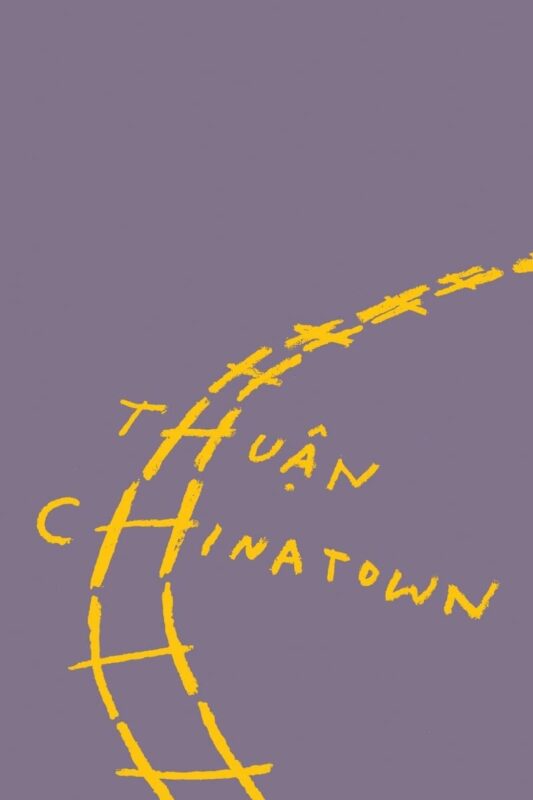
In a recent interview with Asymptote Journal, Vietnamese writer Thuận notes how frequent descriptions of Vietnam stop abruptly at its exoticization: “To the French and foreign readers in general, the Vietnamese landscape is beautiful, Vietnamese cuisine is delicious, Vietnamese women are gentle, Vietnamese men are brave…But I want to remove those clichés by writing about something completely different.” Thuận’s cast of characters in Phố Tàu, or Chinatown, show the complex lives of Vietnamese people calculating their futures in the socialist republic and of Vietnamese migrants struggling to get through low-paying day jobs, past trauma, and racism. Originally published in Vietnamese in 2005, Chinatown became Thuận’s first novel to be translated to French by Đoàn Cầm Thi in 2009, and now to English by Nguyễn An Lý in 2022. Nguyễn’s English translation preserves Thuận’s rhythmic simple sentence structures and stream-of-consciousness narrative style. Although Chinatown’s narration of tangential details and lack of section breaks can make the novel feel frustratingly aimless at times, Thuận’s form lends itself to portraying just how deeply systemic oppression can construct the worldview of third-world people as they search for or become trapped by illusions and hallucinations of survival. Chinatown is humorous, critical, and surprisingly tender in its most powerful moments.
Much of the narrator’s life is shaped by her parents’ calculation of a successful future in Vietnam, which depended on the geopolitical landscape. But “my parents don’t give a damn about politics, about how to tell capitalism from socialism, or if Putin and Chirac are even the same guy,” the narrator clarifies. “The only damn they give is about the word ‘future.’ In the 1980s that word was brilliantly colored with the red of Soviet Russia.” She fulfilled her parents’ wishes to get a Russian degree in Leningrad, yet the detailed future they envisioned—their daughter and son-in-law returning from Russia to Vietnam with their doctorates, party membership, and a placement already at “this ministry or that university”—was thwarted on multiple fronts, from the narrator’s marriage to the Sino-Vietnamese boy Thụy that her sinophobic parents refused to acknowledge, to the dissolution of the Soviet Union. But as soon as Vietnam “washed off the brilliant red coat of donated Soviet paint and donned the new cloak of perestroikaesque đổi mới,” and Thụy left behind the narrator and their child Vĩnh in Hanoi for the large Chinese-Viet quarter of Chợ Lớn in Saigon, her parents resumed with their calculations. “Silently we marched toward the word ‘future’. The word ‘future’ was also flexible in the era of đổi mới,” Thuận writes, as the narrator’s parents send her off to France and await news of her successful future.
Her parents live vicariously through her, imagining her Parisian life of sophistication and abundance. Yet the thirty-nine-year-old narrator suffers from what she calls an “incurable disease,” the psychological impact of being marginalized in the West. Not even in her elaborate delusions can she imagine receiving support to escape her immigrant predicament; the narrator imagines seeking therapy and then being turned away:
At the door, by way of soothing me, the secretary will helpfully hand me a xeroxed list of associations twenty pages long. I am to spend a week poring over the list, to determine which one can help me best in my plight. The Asian immigrant association, or the single mom society, or the guild for teachers of the worst-performing secondary schools, of the alliance for victims of war, or the league of women approaching menopause, or maybe all five together.
Thuận labels the narrator’s various “plights” by listing off support organizations that foster community and solidarity. Yet the narrator views such communal activities as bothersome, time-consuming chores. Baring her heart at a weekly meeting requires arranging with a neighbor to watch her son, and participating in the annual picnic means she needs to rent a bicycle and make sandwiches in advance. The narrator seems to scoff at the artificiality of community by pointing out the hassle of “pay[ing] the joining fee” and “find[ing] a photo for my membership card”—an inclusion that seemed shallowly dependent on her completing these bureaucratic tasks not worth her time. The twenty-page list of associations and the narrator’s projected to-do list upon joining an association further depersonalizes the narrator from her plight, doubly alienating her as a migrant.
What struck me most about this section was how the narrator repeats the same thought process while turning her attention to her son:
Then, in the spirit of psychology I should find Vĩnh his own association. And pay his joining fee. And find a photo for his membership card…And set aside one day a week, a different day than his Chinese class in rue Tolbiac, to take him to his association. And wait outside for two hours while he bares his heart to his fellow members.
Thuận generally presents Vĩnh as a mature eleven-year-old who understands that “his father and mother are separate entities,” but the narrator, upon processing her own childhood dictated by her parent’s devotion to the Future, understands that Vĩnh is navigating his own complicated feelings of being Sino-Vietnamese while being raised by his single Vietnamese mother in Paris.
Chinatown is thus attentive to intergenerational trauma, and the knowledge that children of migrants come to gain from watching their parents endure. When the narrator “covered [her] face with [her] hands and cried in fear” in front of her students during class one day because of her hallucination, it is her student Yamina, whose refugee mother also suffered from “very bad dream[s],” who stays behind to comfort her. Although the narrator then seems to veer off from this heartfelt scene to outline her strange “Schedule of Six and Sixty,” Yamina, her brother Yasin, and her mother ultimately make their way back into the narrator’s mind, in her imagination:
Six days later Yasin brought me a bag of food prepared by his mom…I opened it to find six birds spreading their wings on emerald-green leaves, some unknown vegetable. Later I found in a library six books on North African cuisine. The pigeon seasoned with forest honey is celebrated as the six-generation ancestor of the roast pigeon marinated in hung liu…Later I met six other schoolgirls named Yamina, with six younger brothers named Yasin. At the end of the year they all gave me six handkerchiefs, embroidered with six flowers and six leaves. But this Yamina is the one I remember most. Her mom’s six pigeons spreading their wings on six kinds of emerald leaves is something that will always remain in my memory.
Initially, the repetition of six seems to arbitrarily hold everything in the hallucination sequence together. Nevertheless, the gesture of Yamina’s mother preparing a beautiful North African dish as a gift to the narrator, and the dish’s connection with the roast pigeon dish that the narrator often goes to Chinatown to buy for her son, reveals the narrator’s tender imagination of comfort and connection with marginalized groups.
Chinatown, in its English translation, introduces a rare but much-needed narrative of the diasporic Vietnamese experience that complicates more familiar Vietnamese American memoirs written in English of what it is like to grow up in an immigrant family and pursue the American dream. Such stories themselves are complex and important, and must continue to be told even when they are not always heard. But I also desire to find Vietnam and Vietnamese people in stories where they are not locked in the popular imaginary as a tourist getaway or a warzone, constantly haunted by and processing its relationship with the United States, when the experiences of the Vietnamese diaspora range globally. The voice, setting, and characters of Chinatown fulfilled that for me. I’m excited for Thuận’s readership to grow with Nguyễn An Ly’s English translation of Chinatown, and for future English translations of Thuận’s works, which have enriched the genre of diasporic Vietnamese literature.
Chinatown
by Thuân
translated by Nguyễn An Lý
New Directions, $16.95
 Cathy Duong is a current Masters student at UW Seattle Genetic Counseling program. In her free time, she enjoys traveling to Little Saigons, playing V-pop on her ukulele, and analyzing diasporic Viet literature.
Cathy Duong is a current Masters student at UW Seattle Genetic Counseling program. In her free time, she enjoys traveling to Little Saigons, playing V-pop on her ukulele, and analyzing diasporic Viet literature.


